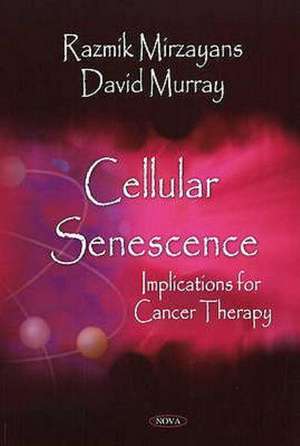Cellular Senescence: Implications for Cancer Therapy
Autor Razmik Mirzayans, David Murrayen Limba Engleză Paperback – mai 2017
Preț: 488.55 lei
Preț vechi: 514.27 lei
-5% Nou
Puncte Express: 733
Preț estimativ în valută:
93.51€ • 101.61$ • 78.60£
93.51€ • 101.61$ • 78.60£
Carte indisponibilă temporar
Doresc să fiu notificat când acest titlu va fi disponibil:
Se trimite...
Preluare comenzi: 021 569.72.76
Specificații
ISBN-13: 9781606926765
ISBN-10: 1606926764
Pagini: 113
Ilustrații: tables & charts
Dimensiuni: 230 x 155 x 9 mm
Greutate: 0.23 kg
Editura: Nova Science Publishers Inc
Colecția Nova Science Publishers, Inc (US)
ISBN-10: 1606926764
Pagini: 113
Ilustrații: tables & charts
Dimensiuni: 230 x 155 x 9 mm
Greutate: 0.23 kg
Editura: Nova Science Publishers Inc
Colecția Nova Science Publishers, Inc (US)
Cuprins
Preface; Introduction; Telomerase-Based Senescence; Stress-Triggered Premature Senescence; Features of Premature Senescence; Different Modes of Growth Arrest are Triggered by Genotoxic Stress; Classification of CDK Inhibitors; Roles of P21, P53 and P16 in Senescence; Regulation of P21WAF1 Transcript and P21 Protein Levels; Mode of Action of P21; P53 Signaling and Cellular Response to DNA-Damaging Agents; Cell-To-Cell Communication Triggered by DNA-Damaging Agents; Modulating Senescence in the Context of Cancer Therapy; Aging, Senescence, and "Hormesis"; Human Genetic Disorders Associated with Genomic Insenomic Instability and Cancer Predisposition; Biological Consequences of the Failure of Cells to Undergo Senescence/Apoptosis Following Genotoxic Stress: Basis for the Emergence of Highly Metastatic and Therapy - Resistant Disease?; Conclusion; Index.
